1. 引言
上海世博会的成功举办对其后上海相当长一段时期的经济发展影响深远。时至今日,有关世博后续场馆利用、世博促进产业经济转型和长三角区域经济一体化等“后世博”话题仍频现报端,作为21世纪中国重大事件之一的上海世博会无疑留下了浓墨重彩的一笔,然而也有人对它的投入产出比提出了质疑,上海世博会的真正价值究竟何在?明年,意大利将迎来米兰世博会,新一轮的“世博高潮”又将来临。此时,我们运用系统动力学的理论来重新分析上海世博会对于上海经济的后续效应或许可以给我们带来不一样的启示,其中对于“后世博”效应的系统动力学模型构建就显得至关重要。
2. 系统动力学模型的构建
系统动力学模型是指一种描述系统各组成部分(要素)之间以及系统与环境之间相互关系的模型,是概念模型到定量模型的中介,适用于一些难以量化的系统模型分析,经常用于分析经济、环境、管理等方面的系统结构问题,为制定系统规划提供科学依据[1] 。本文的系统动力学分析共分为三个层次:第一层次是受世博会影响较大的投资和消费及其影响因素,这是直接拉动GDP增长的因素;第二层次是受世博会影响较大的各个行业;第三层次是三大产业。
由于本文主要研究上海世博会对上海经济的影响,因此将世博会作为外生变量通过影响投资、消费来促进相关行业的发展,进而通过产业对GDP的增长产生影响。
2.1. 模型边界及各变量之间的关系定义
2.1.1. 投资和消费
投资、消费和出口是目前影响我国GDP的三大主要因素[2] 。消费与投资都对经济增长具有重要的作用,而且二者具有联动的效应[3] 。[4] 通过数学模型验证了投资和消费的变化与经济增长均呈正向密切相关关系,而且投资和消费每增加1%,则GDP分别增加0.1265%和0.1755%。同时,消费需求还是阻止经济剧烈波动的稳定力量。因此,刺激内需,合理引导消费是目前促使GDP增长的有效途径,也是政府工作的重点(图1)。
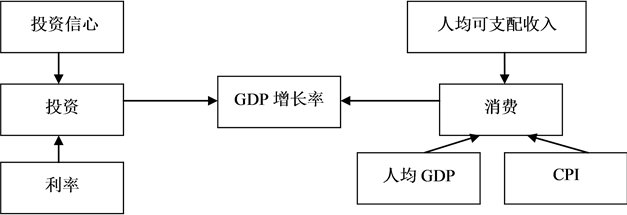
Figure 1. The relationship among investment, consumption and growth rate of GDP
图1. 投资消费与GDP增长率之间的关系
2.1.2. 受世博会影响较大的行业
官方数据显示,上海世博会直接投资为286亿元,如果加上车站这类配套建设投资,财政总预算达到3000亿~4000亿元。考虑到世博会巨大的乘数效应,我们将模型中的投资区分为基础设施投资和城市发展配套投资两部分。
从时间序列看,上海世博会对行业的拉动效应分别体现在筹备阶段、消费提升阶段和后世博效应阶段,受其影响最大的行业包括建筑业、房地产业、交通运输业、宾馆餐饮业和会展旅游业。
建筑业和房地产业的发展直接受益于世博会筹备阶段的巨大投资,在世博召开的前两年,即2008年上海已经进入世博的全面建设时期,投资增速也已经达到高峰。由于建筑业和房地产业的涉及面较广,为研究方便,本文所指的建筑业主要是指公共设施建设,受基础设施投资的影响;房地产行业主要是指住宅房地产,受政策因子、消费价格、基础设施投资和居住类消费的影响,其中政策因子发挥重要作用。
交通运输业、宾馆餐饮业和会展旅游业的发展则得益于世博会召开吸引的超大客流带来的消费提升。据上海世博会官方网站显示,持续了184天的上海世博会吸引了来自国内外的7308万参观者,巨大的客流有力地促进了上海当地的消费,直接拉动宾馆餐饮、会展旅游和交通运输业的发展。有鉴于此,我们在模型中将这三大产业直接和非居住类消费量挂钩,同时非居住类消费量受到世博会消费量的刺激。
需要特别指出的是,会展旅游业还是后世博阶段的主要受益行业。世博会召开大大提升了上海的国际知名度,世博会场馆的维护和改造继续带来着参观客流,这一点可从世博后观众参观中华艺术宫(原中国国家馆)、上海月亮船(原沙特馆)、上海意大利中心(原意大利馆)的饱满热情中得到印证。
2.1.3. 行业、产业和GDP之间的关系
根据行业性质的不同,可以把不同的行业分为三大类:第一产业,第二产业和第三产业。根据上海市统计年鉴,第一产业主要是指农业,每年的产业值变化不大;第二产业包括工业和受世博会影响较大的建筑业;第三产业主要指服务业,其中受世博会影响较大的有房地产业、交通运输业、宾馆餐饮业和会展旅游业。
根据不同产业的产值和结构来研究GDP及其增长率是宏观经济研究的一项基本方法[5] 。合理调控产业结构,促进产业升级,是实现GDP增长、优化经济的有效途径(图2)。
2.2. 上海世博会对上海经济影响的系统动力学模型
通过以上分析,我们可以按照系统动力学的方法绘制系统流图。在流图绘制过程中,出于仿真预测的需要,本文设置了利率和人均可支配收入两个经济变量来考察政府对经济的调控行为。
流图中包含有3项状态变量,分别是常规投资量、常年消费量和GDP总量;3项速率变量,分别是投资增长量、消费增长量和GDP增长量。另外,在系统流图中还有25项辅助变量。变量的具体分类情况如图3。
2.3. 经济变量之间数量关系的确定
为了增强研究的有效性和同一性,本文所有变量的数据均出自《上海市统计年鉴》的标准数据。采用SPSS16.0等软件,经过回归分析后得出各个变量之间的关系。
2.3.1. 系统初值的确定原则
本文经济变量初值的确定原则有以下几点:
1) 直接赋值法。在本文研究的系统动力学模型中,对于状态变量的初值采用直接赋值,数据来源是《上海统计年鉴》。
2) 线性回归法。在对一些经济辅助变量进行赋值时,由于在现实情况下没有直接的数据来源,本文

Figure 2. The relationship among trade, industry and GDP
图2. 行业、产业和GDP之间的关系

Figure 3. The system dynamics flow chart of the World Expo impact on the Shanghai’s economy
图3. 上海世博会对上海经济影响的系统流图
对于这些经济辅助变量采用一元或多元线性回归的方法进行分析,线性回归分析软件为SPSS 16.0。
3) 加权平均法。对一些可以从统计年鉴上查得的数据,如工业增长率、第一产业增长率等,根据数据之间的数量关系采取加权平均法进行赋值,其加权值由统计年鉴中历史数据的变化趋势来确定。
4) 逻辑推断法。在经济模型运行过程中,有些经济变量的初值在以上几种赋值方法的初步确定下也不能达到本文研究的要求,对于这些经济变量会根据专家讨论以及对统计年鉴中统计数据的值进行分析来确定。如:房地产增长率的数量关系等。
模型中与价格相关的数据均以2000年为基年的价格指数计算,如GDP是根据GDP指数计算,产业增长率、工业增长率、建筑业增长率等分别根据产业增长指数、工业增加指数、建筑业增加值指数计算。第二产业增长率由工业增长率与建筑业增长率加总确定。
2.3.2. 各变量间的数量关系
下面是在图3所绘制的系统流图的基础上,对动力学模型图中各项经济变量之间的数量关系、参数取值以及经济变量的初值的详细表示。其中t代表时间,用年份数字表示。
1) 各变量间表达式
经过实证分析后,建立各变量间的因果关系和表达式如下:
L表示水平变量,N表示流量变量,C代表常数,A代表辅助变量
L:常年投资量Ia = INTEG(投资增长量,1869.67)
A:世博会投资 = Withlookup (time, ([(2000,0)~(2020,100)], (2000,0), (2001,0), (2002,0), (2007,12.7), (2008,43.16), (2009,97), (2010,35), (2011,0), (2012,0), (2013,0), (2014,0), (2017,0), (2019,0))
N:投资增长量 = 年投资量Ia*投资增长率
L:年消费量Ca = INTEG(消费增长量,1013.24)
N:消费增长量 = 消费增长率*年消费量Ca A:投资增长率 = 利率^0.7*投资信心^0.3 C:利率 = 0.005 A:投资信心 = Withlookup (GDP增长率,([(0,0)~(1,1)], (0.0030581,0.0350877), (0.0917431,0.267544), (0.189602,0.539474), (0.33945,0.75), (0.574924,0.785088), (0.703364,0.719298), (0.892966,0.692982), (0.990826,0.587719))
A:城市配套投资 = 391.6 + 0.59*常年投资量Ia + 10*世博会投资(根据回归拟合)
A:基础设施投资 = −391.59 + 0.41*常年投资量Ia + 世博会投资(根据回归拟合)
A:消费增长率 = (−1.111 + 0.016*人均可支配收入 − 0.011*人均GDP + 0.012*消费价格(CPI))
L:人均可支配收入 = INTEG(人均可支配收入,1.1)
A:人均GDP = GDP总量/常住人口
L:常住人口 = INTEG(常住人口,1361.63)
A:消费价格 = Withlookup(time, ([(2000,0)~(2020,200)], (2000,102.5), (2001,100), (2002,100.5), (2003,100.1), (2004,102.2), (2005,101),(2006,101.2), (2007,103.2), (2008,105.8), (2009,99.6), (2010,108.772), (2013,106.14), (2014,107.895), (2016,106.14), (2017,107.018), (2018,110.526), (2019,108.772))
A:居住类消费量 = 43.3289 + 0.0848559*常年消费量Ca(根据回归拟合)
A:非居住类消费量 = −43.3287 + 0.965144*常年消费量Ca + 世博会消费量(根据回归拟合)
A:世博会消费量 = Withlookup(time, ([(2000,0)-(2020,2000)], (1999,0), (2000,0), (2002,0), (2003,0), (2005,0), (2007,0), (2008,0), (2010,980), (2011,0), (2013.33,0), (2015,0), (2019,0))
A:房地产行业增长率 = (基础设施投资*9.1e−005)^0.2*(0.235883 + 居住类消费量* (−0.000145803))^0.4*(政策影响因子)^0.2*(0.018*消费价格(CPI))^0.2 A:政策影响因子 = LN(2)(0~1表示政策严格,1以上表示政策的宽松度)
A:建筑业增长率 = LN(基础设施投资)
C:工业增长率 = 0.13(求平均数所得)
A:交通运输行业增长率 = (基础设施投资*0.003)^0.6*(非居住类消费增长率)^0.4 (系数表示基础设施投资对交通运输行业产值的边际增长率,回归拟合)
A:宾馆餐饮业增长率= (城市发展配套投资*0.004)^0.6*(非居住类消费增长率)^0.4 (系数表示城市配套投资对宾馆餐饮行业产值的边际增长率,回归拟合)
A:会展旅游业增长率 = (城市发展配套投资*0.001)^0.5*(非居住类消费量*0.001)^0.5(系数表示城市配套投资对会展旅游行业产值的边际增长率,回归拟合)
A:其他第三产业增长率 = 0.32 C:第一产业增长率 = 0.025 A:第二产业增长率 = (工业增长率 + 建筑业增长率)/2 A:第三产业增长率 = (交通运输行业增长率 + 会展旅游业增长率 + 其他第三产业增长率 + 宾馆餐饮业增长率 + 房地产行业增长率)/5 A:GDP增长率 = 第一产业增长率^0.1*第二产业增长率^0.3*第三产业增长率^0.6 N:GDP增长量 = GDP增长率*GDP总量
L:GDP总量 = INTEG(GDP增长量,4551.15)
2) 变量初值:
以下变量的初值为《上海统计年鉴》中2000年的统计值。
GDP总量初始值 = 4551.15亿元;常年投资量初始值 = 1869.67亿元;常年消费量初始值 = 1947.10亿元;
人均可支配收入初始值 = 1.1万元;常住人口初始值 = 1321万人。
3. 模型的检验
建立好模型后,需要对模型进行相关的定性和定量检验后才能运用该模型进行决策和仿真。定性检验包括模型的实用性和有效性,定量检验包括拟合优度检验和灵敏度检验。
本文主要研究上海世博会作为大型节事对上海市经济增长的影响,模型中变量的选取基于现有文献和上海世博会这一具体情境,具有一定的实用性和推广性。模型的检验集中于拟合优度检验和灵敏度检验。
3.1. 拟合优度检验
拟合优度检验是指对于模拟值与实际值之间拟合程度的检验,如果模型的模拟值不能很好的拟合历史数据,就无法反映未来的发展趋势,本文仿真检验的时间区间是2000年到2020年。我们共对模型中的7项主要经济变量进行了[真值–仿真值]对照检验,它们分别是建筑业产值、宾馆餐饮业产值、交通运输业产值、会展旅游业产值、第二产业产值、第三产业产值、GDP。房地产行业由于受政策因素影响较大,暂不检验。模型检验结果的相对误差基本控制在5%之内,只有个别数据的误差大于5%,表明本模型的模拟值与实际值之间的拟合程度较高(见图4到图10)。
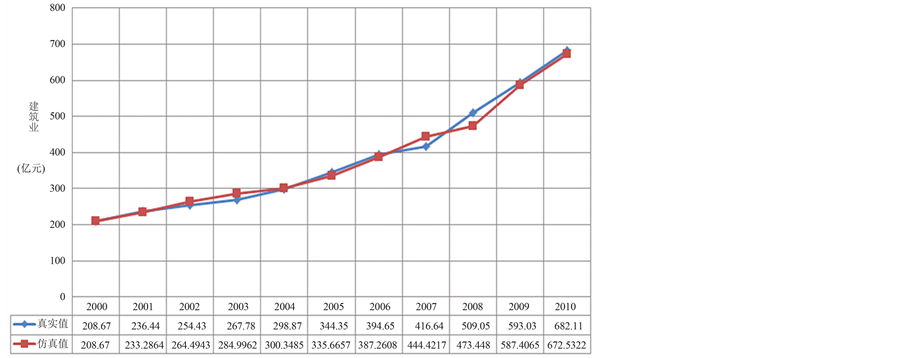
Figure 4. Simulation of construction industry
图4. 建筑业仿真结果
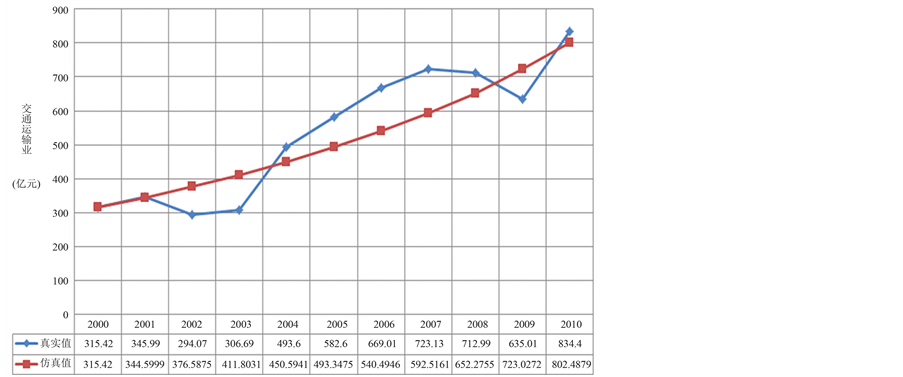
Figure 5. Simulation of transportation industry
图5. 交通运输业仿真结果

Figure 6. Simulation of hotel and catering industry
图6. 宾馆餐饮业仿真结果
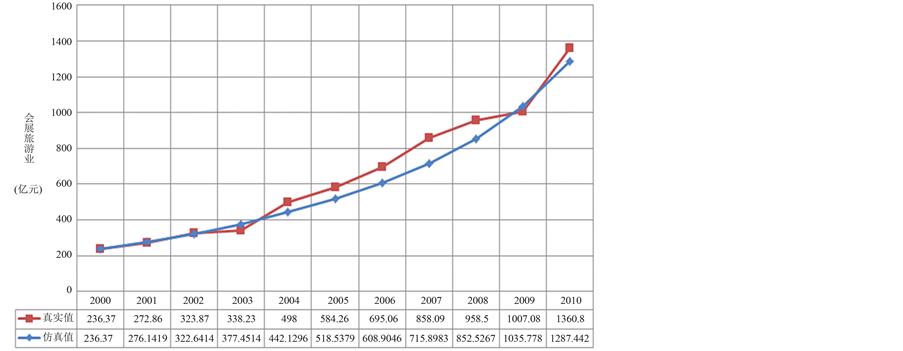
Figure 7. Simulation of tourist industry
图7. 会展旅游业仿真结果

Figure 8. Simulation of secondary industry
图8. 第二产业仿真结果

Figure 9. Simulation of tertiary industry
图9. 第三产业仿真结果

Figure 10. Simulation of GDP
图10. GDP仿真结果
由图4到图10可知,建筑业、第二产业、第三产业以及GDP的仿真值与真实之间的误差在5%左右;根据图5,交通运输业从2000年到2003年的行业值分别是315.42亿元、345.99亿元、294.07亿元、306.69亿元,行业波动较大,导致仿真误差较大;图7可知会展旅游业从2003年开始进入高速发展期,超过了历史平均水平,从而导致2003年到2008年的仿真值误差偏大,而从2009年开始由于世博会的影响,行业整体发展较快,在系统中合理的运用世博会这一外生变量,有效地缩小了仿真值与真实值之间的误差,这也说明世博会这一外生变量在系统中是不可替代的。
需要特别指出的是图6,宾馆餐饮业的产值从2000年到2010年分别为53.87亿元、104.3亿元、138.44亿元、138.89亿元、104.3亿元、168.31亿元、194.08亿元、219.36亿元、244.36亿元、238.36亿元、266.45亿元。2001年上海市宾馆餐饮出现飞跃式发展,增长率95%以上,之后在此基础上按照一定的比率逐步增长。值得注意的是,由于受到2003年非典的影响,2003年和2004年上海市宾馆餐饮出现反常。另一方面,由于上海宾馆餐饮在全国处于发展前列,因而其增长率往后有变小的趋势。这两个因素都在本模型考虑之外,故而仿真误差相对较大。
3.2. 灵敏度检验
灵敏度检验是研究与分析一个系统或模型的状态或输出变化对系统参数或周围条件变化的敏感程度的方法,主要用于原始数据不准确或发生变化时最优解的稳定性的研究[6] 。
灵敏度检验主要包括三部分:外生变量检验,参数检验和模型结构检验。
1) 外生变量检验主要是检验外生变量的有效性,即外生变量对模型是否有显著影响。本文的研究基于这样的假设:上海世博会作为外生变量对整个系统产生影响。因此,需进行完整的外生变量检验。
经过检验,发现当没有世博会这一外生变量因素时,建筑业、宾馆餐饮、交通运输和会展旅游等受世博会影响较大的行业增长率不会出现大的变动,进而各产业不会发生较大的变化,GDP增长率不会从2007年开始出现大规模增长,到2010年世博会结束后出现回落。因此,上海世博会作为一个外生变量,对整个系统有十分重要的影响。其他各外生变量,如CPI等也都通过验证(图11)。
2) 参数检验主要针对参数的不确定性。在系统动力学中,有些参数只能知道其取值范围,而不知道确定的值,通过灵敏度检验来分析这种不确定性对系统的影响[7] 。经过系统分析,可知利率、人均可支配收入和产业结构比例是灵敏度较高的参数。
3) 模型结构检验是检验模型行为改变时对于系统的影响,即改变模型结构对于系统的影响,增强模
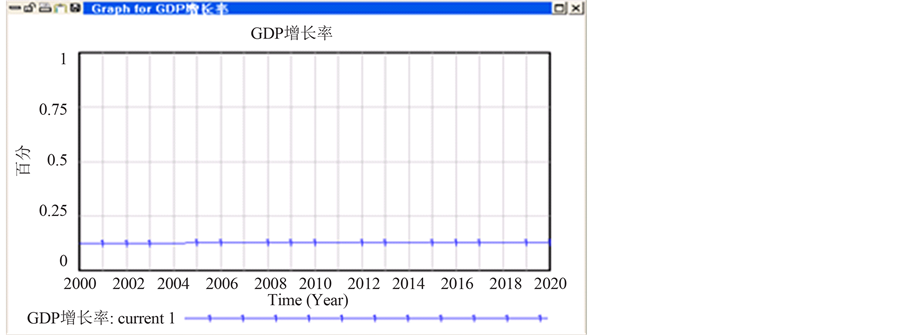
Figure 11. Simulation of GDP growth rate without exogenous variables
图11. 没有外生变量时GDP增长率仿真结果
型对实际系统的模拟能力,以便找出有效的措施和政策。与此同时,灵敏度检验可以用于辅助政策分析[8] 。
4. 仿真模拟分析
4.1. 仿真策略的制定
仿真模拟的基础模型是前面建立并得到检验的系统动力学模型,以2000年的实际数据为初始变量值。基础模型反映的是过去经济的发展趋势,以基础模型直接外推仿真的结果反映的是惯性趋势在未来可能产生的后果。具体的仿真策略如下:
1) 确定参数值
本模型中参数主要有:利率、工业增长率、其他第三产业增长率、第一产业增长率和政策影响因子。利率取2000年到2010年的年利率平均数,得出利率为5%;工业增长率、其他第三产业增长率和第一产业增长率是根据上海市统计年鉴,取2000年到2010年的数据计算的增长率取得平均数得出:工业增长率为0.13,其他第三产业增长率为0.32,第一产业增长率为0.025,其中其他第三产业是指除了受世博会影响较大的房地产行业、宾馆餐饮、交通运输和会展旅游以外的其他第三产业。由于房地产行业受政府宏观调控政策影响较大,在征询了数十位相关专家后本模型中政策影响因子取值为:LN(2),即政策对房地产的影响是正向的。
2) 确定输出变量
本文主要研究作为社会化大事件的上海世博会在其举行前、举行中和举行后对哪些行业产生影响,通过行业影响不同产业的增长进而影响GDP的增长。本文模型中,共有34个经济变量,由于论文篇幅所限,我们把GDP增长率作为主要的输出变量。
3) 仿真结果分析
分析仿真结果是在得出趋势仿真预测结果之后进行合理性和经济意义分析,仿真结果反映了上海市未来经济发展的一定趋势,从一定程度上反映了上海市经济发展的规律。
4.2. GDP增长率仿真模拟分析
根据Vensim软件的测量结果,上海市GDP增长率从2007年开始迅速增大,2010年随着上海世博会的结束而逐渐回落,2011年甚至低于2005年的同期水平。这说明是存在“后世博低谷效应”的,即举办地举办大型节事活动之后发生低谷效应而产生经济水平的剧烈下滑的现象。由于低谷效应很难在短时期内完全被消除,因此在这个阶段,政府应该出台相应的办法和措施以应对低谷效应的发生和缓解其对经济产生的冲击影响(图12)。
5. 结论与展望
本文重点分析了用系统动力学的方法构建“后世博效应”模型的过程。整个模型以上海世博会为外生变量,通过分析其影响投资、消费来促进相关行业的发展,进而通过产业对GDP的增长产生影响的路径,并绘制了上海世博会对上海经济增长影响的系统流图。进而对模型进行了拟合优度检验和灵敏度检验,分别将受世博会影响较大的建筑业、交通运输业、宾馆餐饮业、会展旅游业,以及第二产业、第三产业和GDP值的仿真值与实际值进行比对,取得了较好的拟合效果,系统动力学模型得到了很好的检验。最后,运用此模型主要对GDP增长率进行了仿真模拟,发现了“后世博低谷效应”。根据2014年上海统计年鉴显示,确实在2010年世博会之后上海GDP出现了明显回落(2010年为10.3%;2011年为8.2%;2012年为7.5%;2013年为7.7%),系统动力学的仿真模拟存在一定的意义。

Figure 12. Simulation of GDP growth rate in the initial condition
图12. 初始条件下GDP增长率仿真结果
当然,对于近几年GDP的回落,“后世博”只是其中一个方面的因素而已。社会经济系统是非常复杂的系统,尽管系统动力学的方法比较科学,但也很难对整个社会系统进行完美的拟合,这也是我们的仿真结果仅仅在形态上比较吻合,数值上还存在出入的原因。另外,GDP的增长率下滑还有一个重要原因就是中国政府对于GDP数值的理性化对待和中国经济软着陆的需求,但无论如何,经济的平稳是最重要的,因此接下来进一步研究后世博时代的GDP平稳发展,对于理解政府在后世博时代的诸多举措有很重要的意义。
基金项目
本文受上海市社科基金“后世博低谷效应”的形成机理与主动控制方法研究(项目编号2010EZH005)资助。